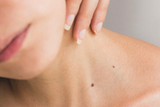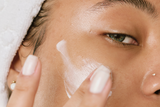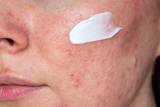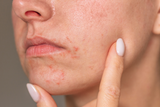Easy Peasy You
Soaps are sustainable: are these old-fashioned cleansers good for your skin too?
Posted by Lara Schimweg on
If you're looking to live a more eco-conscious and minimalist lifestyle, you've surely noticed the current soap boom. They come in every imaginable shape, color, and scent. Soaps made from ash or kaolin. Soaps designed to help with blemishes, others intended to gently care for sensitive skin. Soaps with extra moisturizing properties for dry skin, and good old-fashioned bar soap, the kind our grandparents used to use.
Soaps are alkaline (basic) and therefore damage your skin microbiome.
Soaps contain very aggressive surfactants and therefore wash too much oil out of your skin.
The gentlest form of facial cleansing is a cleansing milk or a mild cleansing gel with mild surfactants.
What is soap?
Should you switch to soap to cleanse your face and body ? Is it true that soap has a positive effect on the skin? Is soap suitable for sensitive skin?
First, let's clarify what soap actually is. That will shed some light on the subject. Soap has been used for washing for a very long time. It was a very reliable cleaning agent. Soap was already being used for cleaning in the 3rd millennium BC. A truly old-fashioned thing, as you can see. Soap production flourished in the 9th century, and since the mid-18th century, soap has been manufactured industrially.

In soap making, fats are saponified with sodium hydroxide. This process produces strong surfactants , the washing agents responsible for the cleansing effect. Soap can be made using either animal fat or vegetable oil. Fortunately, today most soap is made from vegetable oils. Incidentally, natural soap is the same as "conventional" soap. The internet offers a wealth of DIY soap recipes and numerous ready-made products. Some are advertised as mild. But how mild and gentle are soaps really?
What's the real story behind the soap trend?
Soap washes oils out of your skin
Of course, soap is supposed to cleanse. That's what it's for. You might think: "Well, I have very oily skin, so I can't go wrong with soap." But be careful: The surfactants in soap are among the harshest substances there are. Surfactants don't just remove dirt and makeup. They also wash away the natural oils in your skin. Your skin might then produce more oil, and everything could become unbalanced. You can easily check how your skin feels after washing with soap. How does your skin feel?
Does it squeak a little? You might perceive that as a sign of very clean skin. However, healthy skin always has a thin film of oil. Not excessive, just enough so that it no longer squeaks. If your skin squeaks after cleansing, it was already too much and anything but gentle.
Soap attacks your protective acid mantle.
Your skin has a natural acid mantle that protects it from harmful bacteria, fungi, and viruses. The natural pH value of your skin is between 4 and 6, averaging 5 and 6.
For comparison: Water has a pH value of 7. This is considered neutral. Anything above that is alkaline. Soap often has a pH of 9 or higher. Anything below 7 is considered acidic. A lemon is really acidic, with a pH value of around 3. The further the pH value deviates from your skin's natural pH, the more your skin's natural pH value shifts. Even water can slightly alter your skin's natural pH.
Soaps are always basic or alkaline. This means that soap shifts your skin's pH level far too much into the alkaline range, thus attacking its natural protective acid mantle. It's important to maintain this slightly acidic protective mantle, as this is how your skin naturally protects itself against environmental influences. Whenever your acid mantle is not in a slightly acidic balance, your skin is left unprotected against all environmental stressors. With sensitive skin, it usually takes even longer for the skin to return to its natural state.
Skin with an intact, healthy acid mantle ensures that your skin is less prone to irritation and less inflamed and prone to redness. This makes it harder for harmful bacteria, viruses, or fungi to spread on the skin.
Fragrances in your soap irritate the skin.
Unfortunately, most soaps also contain fragrances that aren't really necessary for the skin. Sure, they smell nice. However, synthetic and natural fragrances, including essential oils, can irritate the skin.
Since fragrances are washed off, they are not quite as irritating in a cleansing product as in a cream or serum. However, if you want to play it safe for your skin—especially if you have sensitive skin—then avoid fragrances in your cleanser.
Alternatives to soap
It's perfectly understandable that you want to wash your skin with a cleanser. Using soap can save a lot of packaging waste. Fortunately, there are now natural, minimalist, and sustainable alternatives: so-called syndets . There are conventional and natural syndets. These are solid cleansing bars that look like soaps. They are milder than soaps and can be adjusted to the skin's natural pH level. However, you should be aware that, unfortunately, not all syndets are adjusted to the skin's natural pH level.
Unfortunately, syndets often contain harsh surfactants in addition to mild surfactants. This makes the syndet lather better, cleans more effectively, and solidify more easily. For sensitive skin, syndets can be too harsh for facial cleansing because they can dry out the skin. Those with oilier skin types might tolerate syndets on their face a little better.
Some very mild, natural syndets contain plant butters and waxes, such as coconut oil or carnauba wax. Plant butters and waxes help the cleansing bar retain its shape; otherwise, a very mild syndet would melt in your hands. Some people don't tolerate so much plant oil and butter on their face well, as it can potentially lead to blemishes and breakouts.
For these reasons, the Sydnets currently available on the market are very good for the body , but not ideal for gentle facial cleansing.
A mild cleansing gel or milk with gentle surfactants is the gentlest way to cleanse your facial skin, especially if you don't tolerate harsh surfactants or rich butters like coconut oil very well.
- Tags: Hautpflege, Rosacea
← Older Post Newer Post →
0 comments








